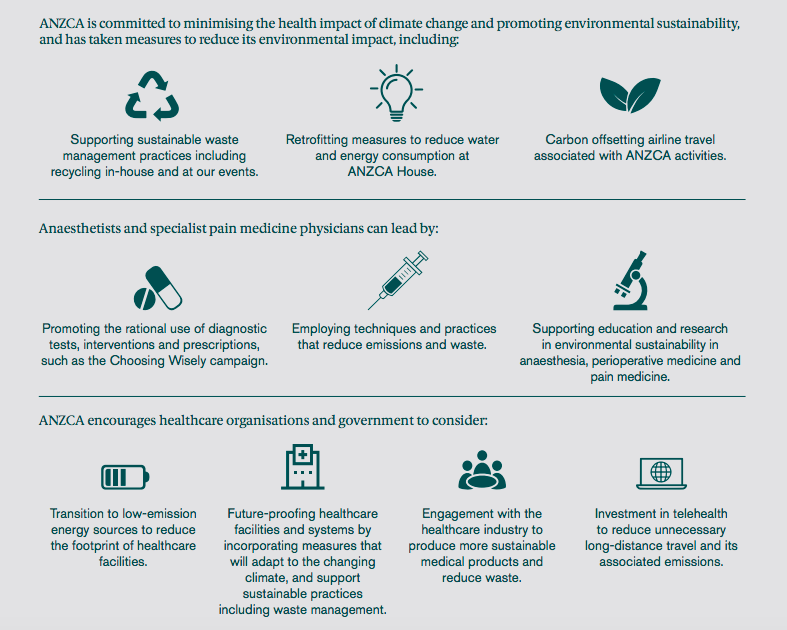Join the Environmental Sustainability Network
The Environmental Sustainability Network (ESN) advocates, collaborates and promotes initiatives and projects related to environmental sustainability within anaesthesia, perioperative and pain medicine and is available to fellows, trainees, SIMGs and non-ANZCA members.
ANZCA statement on climate change
In January 2020, ANZCA released a statement on climate change. See the full statement here. More information about ANZCA’s position on environmental sustainability can be found in its professional document PS64: Statement on Environmental Sustainability in Anaesthesia and Pain Medicine Practice.
See the full statement here. More information about ANZCA’s position on environmental sustainability can be found in its professional document PS64: Statement on Environmental Sustainability in Anaesthesia and Pain Medicine Practice.
The Environmental Sustainability Audit Tool
The Environmental Sustainability Audit Tool has been developed by the ANZCA Environmental Sustainability Working Group and was launched on World Environment Day, 5 June 2020. The tool has been created to assist departments and practitioners to develop and maintain practices that promote environmental sustainability in line with ANZCA’s professional document PS64: Statement on Environmental Sustainability in Anaesthesia and Pain Medicine Practice.
While there are many actions that may be undertaken to improve sustainable practice broadly within the health sector, this audit tool is designed to help identify interventions that could reasonably be considered at an individual or departmental level.
The audit tool groups activities to improve environmental sustainability under the following headings: reduce, reuse, recycle, and leadership.
In this video, ANZCA councillor Dr Scott Ma and Wollongong-based trainee anaesthetist Dr Jess Hegedus explain how the audit tool was developed and how to use it.
Recognition for ANZCA's carbon offsets
Introducing cloth theatre hats in your hospital
Green college guidelines
ANZCA proudly supports the Doctors for the Environment Australia (DEA) and Australian Medical Association (AMA) GreenCollege guidelines, produced to facilitate practical and affordable organisational initiatives and improvements to reduce environmental impact.
Healthy Climate Future Campaign
ANZCA is one of thirteen medical colleges and eleven specialty societies that are partners in the Healthy Climate Future Campaign.
Representing more than 100,000 doctors, the campaign advocates for climate action to build healthy and climate-resilient communities and environmentally sustainable healthcare systems.
The college contributed to, and endorsed, the Royal Australasian College of Physicians (RACP) commissioned research report Climate Change and Australia’s Healthcare Systems – A Review of Literature, Policy and Practice.
We are also a member of the RACP’s Climate Change and Health Multi-College Advisory Committee which provides a forum for engagement and collaboration of medical colleges on climate change and health policy and advocacy.
Explore our other environmental sustainability initiatives
Information about the environmental impact of anaesthesia.
ANZCA is committed to proactive and positive action that reduces its environmental footprint.
We're helping to support research exploring the environmental impact of anaesthesia and related products and activities.
The purpose of the ESN is “to advocate, collaborate and promote initiatives and projects related to environmental sustainability within anaesthesia, perioperative and pain medicine”.
